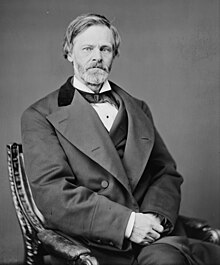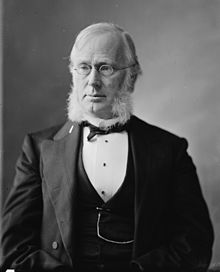Half-Breeds (politics)
Blaine's political organization during this time formed an informal coalition with the Stalwarts in opposition towards aspects of the Hayes administration,[8] a notion affirmed by the writings of Richard E. Welch Jr.
In spite of the faction's broad advocacy of civil service reform in their decries of corruption, several members were known to have engaged in illicit practices for personal or partisan benefits.
Congressman and Senator Henry L. Dawes was revealed as a stockholder for Crédit Mobilier amidst the scandal;[9][10] George F. Edmunds of Vermont was later suspected by Richard F. Pettigrew of being "distinctly dishonest" and a "senatorial bribe-taker.
This powerful GOP bloc which included Henry Winter Davis, Benjamin Wade, Thaddeus Stevens, and Charles Sumner continuously criticized Lincoln for failing to advance as efficiently as possible, and the president's more staunch supporters were the Moderate Republicans.
Republican congressman Thomas A. Jenckes of Rhode Island during the presidency of Ulysses S. Grant introduced legislation pushing for mild civil service reform,[13] which was enacted.
Jenckes, who disregarded the plight of Southern blacks facing danger from Democratic white supremacist terrorists such as the Ku Klux Klan,[14] left office before the congressional "Half-Breeds" obtained its reputation as a functioning bloc, though can be viewed as a forerunner to the faction.
Although the Half-Breeds had no rigid organization as a congressional bloc and were viewed as merely a group of disgruntled Blaine supporters promoting factionalism, their influence proved to be highly significant.
[15] The group's ambitions, aside from moderate civil service reform,[16] included advocating industrial strength, railroad interests, higher protective tariffs,[17] expanding markets abroad, and a business-friendly currency system on the national level.
According to Professor Richard E. Welch Jr., the Half-Breeds were "party regulars" who "damned" bolters, were not uniformly independent in political nature nor advocates of the spoils system, and more intelligent than personal in comparison to the Stalwarts.
Soon after taking office, Hayes abandoned his past Radical Republicanism and along with Secretary of War George W. McCrary pulled federal troops from the Southern states of South Carolina and Louisiana,[22] all but ensuring a Jim Crow Democrat takeover of the region.
[24] Hayes' decision to remove Arthur from the New York Customs House angered not only Stalwarts but even elicited the criticism of the Blaine faction, who questioned the wisdom of the action and had earlier stood side-by-side with the president.
Despite Conkling's attempts at imposing a unit-rule in the Republican National Convention by which a state's votes would be grouped together for only one candidate,[30] a number of Stalwarts went against him by vocalizing their support for Blaine.
The act also set up the United States Civil Service Commission, banished political tests, denied jobs to alcoholics and created competitive measures for some federal positions.
Former Liberal Republican Party figure Lyman Trumbull, known in part for previously voting against convicting Andrew Johnson, denounced the Blaine/Logan ticket and stated that their potential victory would lead to "partisanship, abuses, and corruption.
Most Half-Breeds were skeptical of Logan, though supported the ticket out of party unity; this included Rutherford Hayes, who called the nomination a "blunder and misfortune" though viewed a Democrat victory as a "serious calamity.
He viewed his Maine colleague as a mere selfish opportunist and refused to support the pair, writing:[39] It is my deliberate opinion that Senator Blaine acts as the attorney of Jay Gould.




